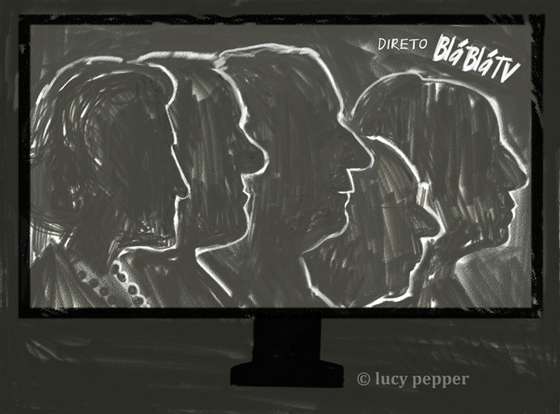Durante a minha primeira visita a Portugal, a única coisa que parecia passar na televisão era Mário Soares. Na altura, ele era primeiro-ministro e eu tinha sete anos, e por isso talvez a minha memória me esteja a enganar, mas é essa a minha primeira recordação da televisão portuguesa: um político a falar — a preto e branco.
E 37 anos depois, os políticos continuam a falar na televisão. Muito. Demasiado. Só que a cores.
Quando vim viver para Portugal, fiquei espantada quando percebi que o Marcelo estava na TV todos os domingos à noite. Quando percebi que ele era da política e tinha agenda, fiquei ainda mais espantada. Na Grã-Bretanha, seria impensável dar a um político, dentro ou fora do governo, uma meia hora por semana para falar numa plataforma nacional. E o meu espanto ainda aumentou mais quando ouvi toda a gente, no dia seguinte, a repetir e comentar o que tinha dito o Marcelo.
Ainda hoje me causa admiração o tempo que é dado na televisão, não só ao Marcelo, mas ao Sócrates, ao Marques Mendes, à Ferreira Leite, ao Santana Lopes e a todos os outros deputados e ministros, antigos e actuais. É que não estão a ser entrevistados. Estão a ser “facilitados”. Não temos cá Jeremy Paxmans ou John Humphrys para lhes fazerem perguntas difíceis. Temos jornalistas-pivôs a fazer perguntas para os ajudar.
Os canais noticiosos transmitem horas e horas de emissão em direto, sem cortes, da AR TV, e têm diariamente políticos a comentar a actualidade política. Assistimos assim a discussões intermináveis sobre o tom com que Passos falou ao Durão, ou sobre a gravata que o Sócrates usou quando disse qualquer coisa ao Costa, ou sobre o que se passa na cabeça do Seguro. Apesar do risco de irritar todos os obcecados da política que conheço, tudo isto me parece um monte de treta desinteressante, que só serve para nos fazer esquecer o que é importante.
A política reina na televisão, na imprensa, em toda a media durante 24 horas por dia, graças aos obcecados da política entre editores, jornalistas, colunistas e bloguistas, que querem catalogar e comentar cada conversa, cada evento e cada palavra dita pelos políticos, e cada palavra escrita ou falada pelos outros comentadores. O resultado disto é uma torrente que se alimenta com todas as tretas e infinitas reportagens, análises, comentários, debates, entrevistas e palestras sem sentido, todos os dias.
Demasiado do que ouvimos e lemos não tem, de facto, nada a ver com os assuntos que motivam a política, coisas como a economia, a pobreza, a desigualdade, a guerra, etc., etc., etc. Em vez disso, quase tudo tem a ver apenas com a política em si mesma, com os políticos, com as máquinas da política, com as personalidades e com os conflitos entre essas personalidades. Por vezes, parece que a política é a razão ser da humanidade. Os obcecados da política devem ser lembrados que isso não é verdade.
Eles esquecem-se que a política foi inventada para que as decisões possam ser tomadas numa quinta-feira a noite na cabana central da aldeia, de modo que a aldeia fique livre para utilizar o resto da semana a caçar esquilos e a tirar larvas do arroz. Com a ajuda dos obcecados da política, porém, a política tornou-se mais importante do que a aldeia.
Talvez alguns pensem que o resultado deste fluxo constante de comentário, análise e debate político seja uma população de eleitores bem informados e interessados. Receio, no entanto, que o resultado seja precisamente o oposto. Nós, “o público”, nunca conseguiremos manter-nos a par da conversa toda. Até porque, na sua maior parte, o que é escrito e dito não tem muita importância. Falta-nos tempo para peneirar todo o blá blá, de modo a encontrar as partes importantes. Temos vidas para viver e coisas para fazer, e, em consequência, acabamos por nos desligar do discurso político. E é assim que aparece este público de não-eleitores apáticos, todos a resmungar “que se lixe a política … são todos uma data de bandidos e de aldrabões.”
Pergunto-me se não seria bom restringirmos a análise política a um dia por semana. Não por mandamento, nem por censura (não fiquem já com comichão), mas para dar verdadeiramente importância à reportagem, análise e comentário político.
Não estou a sugerir que nos desliguemos, que deixemos de ouvir, perguntar e investigar, ou que nos desinteressemos do que fazem e dizem os políticos. Isso é o nosso trabalho enquanto cidadãos: prestar atenção. O que estou a sugerir é que seria importante que tivéssemos tempo para pensar, digerir e perceber as coisas que são mesmo importantes — os assuntos que motivam a política e não a política em si própria. Talvez assim estivéssemos mais inclinados para ouvir os políticos.
Bem, que tal política só nas quintas-feiras à noite?
(traduzido do original inglês pela autora)
What about politics only once a week?
On my first visit to Portugal, the only thing on the TV was Mário Soares. He was prime minister at the time and I was seven so I might be mis-remembering, but that’s what I remember of the TV. A politician talking – in black and white.
There is still an awful lot of politics on the TV, 37 years later – now in colour.
When I first came here to live, I would watch Marcelo on a Sunday night, agog. I understood that he was in politics and that he had an agenda and I was agog. In Britain, it would be unimaginable for a politician, whether in or out of government, to be given at least half an hour of a national platform, every week. I was also agog at how people the next day would be discussing, no, repeating what Marcelo said.
I marvel still at how much free airtime is given to not just Marcelo but Sócrates and Marques Mendes and Ferreira Leite and Santana Lopes and all the other MPs and ministers past and present each day. The thing is that they’re not being interviewed by their hosts. They’re being enabled by them. No Jeremy Paxmans nor John Humphrys here, grilling them and being tough. Here, we have respectful presenter-journalists asking them helpful questions.
The 24 hour news channels transmit hours and hours of live, uncut feed from AR TV (Assembleia da Republica TV, the channel transmitted from inside parliament) and get politicians in on a daily basis to comment on the news and politics, but mostly the politics, and they usually end up talking about why Passos said something to Durão in a certain tone, or why Sócrates was wearing that tie he said something to Costa, or what is going through Seguro’s mind. To risk the ire of the many political completists in my midst, this is a heap of uninteresting and distracting rubbish.
There are 24 hours a day in which politics reign on the TV and in the press and all the other media, enabled by those political completists amongst TV editors, political journalists, columnists and bloggers, who want to catalogue and comment on every conversation, every event, every word spoken by politicians and politician commentators and every word written or spoken by the other political completist commentators. This results in a cyclical self-feeding torrent of drivel and pointless reporting and analysis and comment and debate and interviews and lectures, every single day.
So much of what we hear and read has nothing whatsoever to do with the issues that motivate the politics, things like the economy, poverty, inequality, war, etc., etc., etc. Instead is about the politics themselves, the politicians, the machinations, the personalities and the clashes. Sometimes, it feels like politics are the be-all and end-all of human existence and the political completists have forgotten that actually, no, politics are not all that.
They forget that politics were invented so that decisions could be made on a Thursday night in the village hut so that for the rest of the week, the village could spend its time going out to hunt squirrels and pick the maggots out of the rice. With the help of the completists, though, the politics have become more important than the village.
The desired result of this constant flow of political comment, analysis and public debate is, I assume, a well-informed, politically engaged, voting public. I fear, though, that it results in precisely the opposite. We, “the public”, can’t hope to keep up, to stay engaged, to stay informed. Most of what is written and said just isn’t important. Most of us don’t have time to sift through all the unimportant blah to find the important stuff. We have lives to be lived and things to be done, and we end up disengaging from the whole political discourse. It ends up, I believe, with the voting public becoming an apathetic non-voting public, resorting to their own rhetoric of “what’s the point anyway? they’re all a bunch of thieves and liars”.
I wonder what would happen if political analysis were restricted to one day a week. Not by command from on high, not censorship, before anyone gets their knickers in twist, just by popular demand, a cultural shift in the importance given to political reporting, analysis and comment.
I am not suggesting that we don’t care, don’t listen, don’t pry, don’t investigate, don’t get involved with what the politicians are doing and saying, of course I’m not. It is our job as citizens to do so, to pay attention. What I am saying is wouldn’t it be nice if we had time to think, digest and understand what really matters, the issues, not the politics, and therefore maybe more inclined to listen to what is being said?
So, politics just on a Thursday night, anyone?













